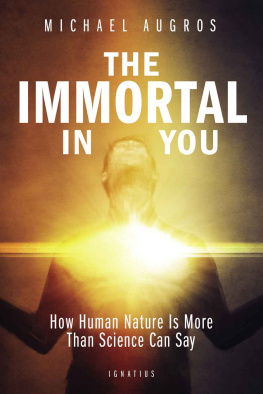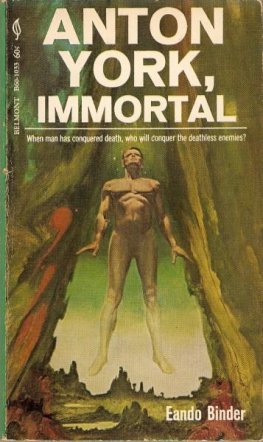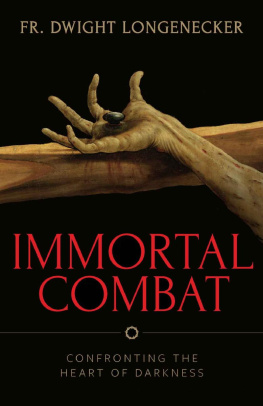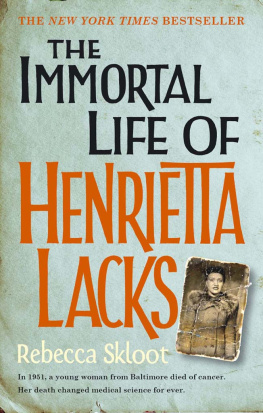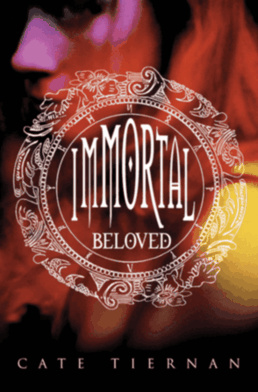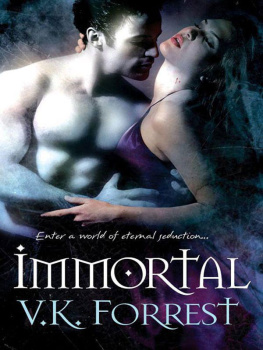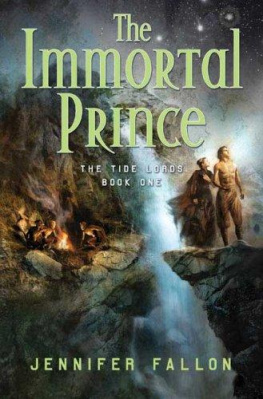Augros - The Immortal in You
Here you can read online Augros - The Immortal in You full text of the book (entire story) in english for free. Download pdf and epub, get meaning, cover and reviews about this ebook. year: 2017, publisher: Ignatius Press, genre: Religion. Description of the work, (preface) as well as reviews are available. Best literature library LitArk.com created for fans of good reading and offers a wide selection of genres:
Romance novel
Science fiction
Adventure
Detective
Science
History
Home and family
Prose
Art
Politics
Computer
Non-fiction
Religion
Business
Children
Humor
Choose a favorite category and find really read worthwhile books. Enjoy immersion in the world of imagination, feel the emotions of the characters or learn something new for yourself, make an fascinating discovery.
The Immortal in You: summary, description and annotation
We offer to read an annotation, description, summary or preface (depends on what the author of the book "The Immortal in You" wrote himself). If you haven't found the necessary information about the book — write in the comments, we will try to find it.
The Immortal in You — read online for free the complete book (whole text) full work
Below is the text of the book, divided by pages. System saving the place of the last page read, allows you to conveniently read the book "The Immortal in You" online for free, without having to search again every time where you left off. Put a bookmark, and you can go to the page where you finished reading at any time.
Font size:
Interval:
Bookmark:
THE IMMORTAL IN YOU
Michael Augros
How Human Nature
Is More than Science Can Say
IGNATIUS PRESS SAN FRANCISCO
Unless otherwise indicated, Scripture quotations are from the Revised Standard Version of the BibleSecond Catholic Edition (Ignatius Edition), copyright 2006 by the National Council of the Churches of Christ in the United States of America. Used by permission. All rights reserved worldwide.
Cover art and design by Enrique Javier Aguilar Pinto
2017 by Ignatius Press, San Francisco
All rights reserved
ISBN 978-1-62164-153-7 (PB)
ISBN 978-1-68149-775-4 (EB)
Library of Congress Control Number 2016947668
Printed in the United States of America
For Amy,
anima mea .
And we, who are we anyhow?
Plotinus, Enneads
Since a soul can know all things, in a way it is all things, and thus it is possible for the completeness of the universe to exist in one thing.
Thomas Aquinas, On Truth
More than Science Can Say
Modern science can say countless true things about youabout what sort of creature you are, about how you and your parts work, about where you came from. But the very success of modern science can tempt us to believe that its questions are the only questions, that its answers the only answers, that there is no more to say about you or the natural world than what science can say. Since the infancy of modern science, certain thinkers and writers have succumbed to this temptation and taken it upon themselves to tell us that science is simply the whole truth about us.
Bertrand Russell was one of the most eloquent of them. He began one of his essays, A Free Mans Worship, by recounting the story of how the demon Mephistopheles reimagined the history of the Creation for Dr. Faustus. In this devils version of events, God got bored with the praise of the angels since they could hardly be expected to say anything bad about him after he had given them eternal life. They were like a bunch of dull, toad-eating brown-nosers. The thought occurred to him how much more entertaining it would be to obtain undeserved praise from those to whom he gave only suffering and a death sentence. God therefore made man mortal. And man, painfully conscious of his own impending doom, out of his own trustful nature invented the idea that Gods purpose must be somehow good for him. Man decided to believe that God had sentenced him to death only because he had somehow deserved it of God, and that God, being so good, would not abandon man to this just punishment, but would save him and give him eternal life. God smiled at this, and when man had renounced all joys for himself in order to please and appease God, the good God sent another sun crashing into mans sun, and annihilated the world and man with it. After reciting this disturbing story, Russell says:
Such, in outline, but even more purposeless, more void of meaning, is the world which science presents for our belief.... That man is the product of causes which had no prevision of the end they were achieving; that his origin, his growth, his hopes and fears, his loves and his beliefs, are but the outcome of accidental collocations of atoms; that no fire, no heroism, no intensity of thought and feeling, can preserve an individual life beyond the grave;... that the whole temple of mans achievement must inevitably be buried beneath the debris of a universe in ruinsall these things, if not quite beyond dispute, are yet so nearly certain that no philosophy which rejects them can hope to stand. Only within the scaffolding of these truths, only on the firm foundation of unyielding despair, can the souls habitation henceforth be safely built.
To take a more recent author who thinks along similar lines, here is a passage from the late historian of science William Provine:
Modern science directly implies that the world is organized strictly in accordance with mechanistic principles. There are no purposive principles whatsoever in nature. There are no gods and no designing forces that are rationally detectable.... Modern science directly implies that there are no inherent moral or ethical laws, no absolute guiding principles for human society.... When I die I shall rot and that is the end of me. There is no hope of life everlasting.... There is no ultimate meaning for humans.
There are plenty of people around today saying the same sorts of things. Nor do you have to read obscure books or journals to find them. You can just go to college (as long as it is not a particularly religious college). Or you can simply read the news. In an article in the New York Times , University of Washington psychology professor David Barash described how he kicks off every school year by giving his students what he calls the Talk. The Talk is about how evolution and religion dont mix. The first clash comes with the existence of a divine being, as one might expect. Living things dont require a supernatural creator, he explains to his students, since life, though wonderfully complex, is an entirely mechanical phenomenon. Barash continues:
A few of my students shift uncomfortably in their seats. I go on. Next to go is the illusion of centrality. Before Darwin, one could believe that human beings were distinct from other life-forms, chips off the old divine block. No more. The most potent take-home message of evolution is the not-so-simple fact that, even though species are identifiable (just as individuals generally are), there is an underlying linkage among themliterally and phylogenetically, via traceable historical connectedness. Moreover, no literally supernatural trait has ever been found in Homo sapiens; we are perfectly good animals, natural as can be and indistinguishable from the rest of the living world at the level of structure as well as physiological mechanism.
So the message is not new, but it is not going away, either. And it is newly aggressive, pervasive, and persuasive. It is also rather bleak in outlook. According to it, you are in no way exceptional or spiritual. You are just a mortal, just an animalindeed, just a machine, no more than a temporary association of molecules that will one day disband in order to become other things. Great consequences attend this view of human nature. If you are thoroughly mortal, you should not entertain hopes of perfect happiness, or of reunion with lost loved ones. If you do not differ from your nearest primate relatives in any sharp and significant way, it would be ridiculous to believe that a divine being (if such a being exists) would take any special interest in you.
One possible recourse for those with religious beliefs running contrary to this stark message is to call into question the science upon which it is supposedly based. Evolution draws a good deal of fire, for example, both because its central tenets conflict with certain interpretations of Genesis and because it is not yet a fully worked-out science. In this book, I will not take that approach, nor will I criticize it. I will simply offer another kind of response entirely to the idea that you are nothing but what modern science can say. Whatever deficiencies do or do not plague the current orthodoxies of evolutionary biology, a much broader and less noticed error underlies the thinking of those who would reduce you to your molecules. The error is the assumption that if you were somehow exceptional, if there were something immortal or spiritual in you, then modern biology would tell us all about it.
The Russian cosmonaut Yuri Gagarin was the first person to go out into space, having orbited Earth in 1961. Not long afterward, Soviet leader Nikita Khrushchev said in a speech at a gathering of the Central Committee of the Communist Party of the Soviet Union that Gagarin flew into space, but didnt see any god there. Let us suppose that Khrushchev was not joking, but took this to be a serious blow to belief in the existence of God. Even if there happened to be some reason to doubt that Gagarin ever really flew into space, that would not be the sole or chief thing wrong with Khrushchevs statement. The main problem with it is the tacit assumption that if God exists, then one would see him once one got above the clouds. Similarly, even if todays biological science were fraught with misconceptions, ambiguities, or slight evidence for its claims, these could not be the only thing wrong with saying that modern biology has never found any supernatural trait in Homo sapiens. Who expected it to? If you have an immortal soul, should you expect it to show up as a white spot somewhere on an X-ray or on a picture produced by an MRI scan? Should the trait of immortality be encoded somewhere in your genome? Of course not. Yet such are the tools and terms of biology. And they are quite excellent for their purposes, too. Only, they dont function very well as detectors of immortality, or finders of souls, whether such things exist or not. To the degree that biology restricts itself to terminology that is fully reducible to that of chemistry and physics, of course its methods will be inept for determining whether you have a soul and what its nature might be.
Next pageFont size:
Interval:
Bookmark:
Similar books «The Immortal in You»
Look at similar books to The Immortal in You. We have selected literature similar in name and meaning in the hope of providing readers with more options to find new, interesting, not yet read works.
Discussion, reviews of the book The Immortal in You and just readers' own opinions. Leave your comments, write what you think about the work, its meaning or the main characters. Specify what exactly you liked and what you didn't like, and why you think so.

